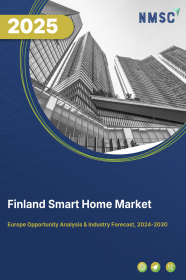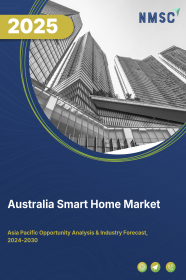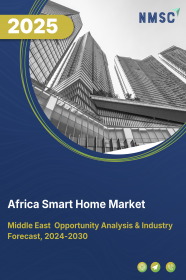
Finland Smart Home Market by Product Type (Smart Lighting, Smart Home Security & Surveillance, Smart Entertainment, and Smart Appliances), by Communication Protocol (Wi-Fi, Zigbee, Z-Wave, Bluetooth, and Thread), by Smart Home Hubs (Standalone Hubs and Built-in Hubs), by Voice Assistants Integration (Amazon Alexa, Google Assistant, Apple Siri, and Others) – Opportunity Analysis and Industry Forecast, 2024–2030
Industry: Retail and Consumer | Publish Date: 15-Feb-2025 | No of Pages: 140 | No. of Tables: 104 | No. of Figures: 69 | Format: PDF | Report Code : RC2280
Finland Smart Home Market Overview
The Finland Smart Home Market size was valued at USD 434.68 million in 2023, and is predicted to reach USD 2290.15 million by 2030, at a CAGR of 26.8% from 2024 to 2030. A smart home, known as a connected home, incorporates cutting-edge technology and automation systems enabling centralized control and monitoring of diverse household devices, appliances, and security features. These intelligent devices are remotely managed and often respond to voice commands or present schedules, delivering heightened convenience, energy efficiency, and security for homeowners. Typical components in connected homes include smart thermostats, lighting systems, security cameras, voice assistants, and other interconnected devices designed to elevate overall quality of life.
Rapid Urbanization is Fueling the Finland Smart Home Market Growth
In Finland, the increasing urbanization phenomenon serves as a catalyst for the expansion of the smart home market. As a larger proportion of the population relocates to urban areas, there is a noticeable uptick in the demand for connected home automation. The allure of urban living, characterized by its fast-paced lifestyle and modern conveniences, drives the necessity for innovative solutions that simplify daily tasks. This trend seamlessly aligns with the adoption of connected homes, offering an efficient and time-saving approach to maintaining clean living spaces. With approximately 85.8% of Finland's population residing in urban regions as of 2023, the market for autonomous cleaning devices experiences significant growth, reflecting the global shift towards connected living and intelligent home solutions.
Increasing Disposable Income is Driving the Smart Home Adoption
The escalating disposable income in Finland facilitates greater adoption of smart home appliances and cutting-edge technologies across the country. Finland boasts an average household net-adjusted disposable income per capita of USD 33,471 annually, surpassing the OECD average. This higher income level enables Finnish households with financial capacity to invest in advanced home automation solutions that enhance convenience and streamline daily routines. Among these solutions, connected homes emerged as a popular choice, enabling homeowners to enjoy cleaner living spaces with minimal effort. The robust economic landscape in Finland, characterized by elevated disposable income levels, serves as a pivotal driver in the growth of the Finland smart home market trends.
Security and Data Privacy Acts as Barrier to the Market Expansion
The smart home market faces a significant barrier to its growth due to concerns surrounding the security of interconnected systems. Devices such as thermostats, cameras, and door locks are susceptible to hacking, posing risks to residents' privacy and safety. Weak passwords or inadequate Wi-Fi network security measures often contribute to this vulnerability. Hackers exploit these weaknesses to gain unauthorized access, potentially compromising devices or accessing sensitive information. To mitigate these risks, homeowners must prioritize strong password practices, regularly update device firmware, and strengthen home networks to reduce the threat of cyber-attacks and safeguard their connected homes from potential breaches.
Integration of Blockchain Technology into Smart Home Devices Presents Lucrative Opportunity for Market Expansion
The integration of blockchain technology into smart home devices offers a promising avenue for strengthening the security and privacy of connected home systems. Renowned for its robust security and transparent features, blockchain technology encrypts and securely stores sensitive connected home data, empowering users to control access permissions and minimizing the risk of unauthorized intrusion. By validating device identities, blockchain ensures that only trusted devices interact within the connected home network, while also automating tasks through tamper-proof smart contracts.
Furthermore, blockchain decentralizes device control, mitigating vulnerabilities and streamlining access control and permissions management. The incorporation of blockchain into connected homes not only enhances security and privacy but also fosters a safer and more confidential connected home environment. Consequently, it is poised to unlock significant growth opportunities for the market.
Competitive Landscape
Several market players operating in the Finland smart home industry include Honeywell International, Inc., Schneider Electric, ABB Ltd, Amazon, Shelly, Samsung, LG Electronics, Google Home, D-Link Systems, Inc., Sensoan Oy.
Finland Smart Home Market Key Segments
By Product Type
-
Smart Lighting
-
Smart Bulbs
-
Smart Light Strips
-
Smart Switches
-
-
Smart Home Security and Surveillance
-
Smart Cameras
-
Video Doorbells
-
Smart Locks
-
Security System
-
-
Smart Entertainment
-
Smart TVs
-
Smart Speakers
-
Streaming Devices
-
-
Smart Appliances
-
Smart Refrigerators
-
Smart Ovens
-
Smart Washing Machines
-
Smart Dishwashers
-
Smart Home HVAC Management
-
Other Smart Appliances
-
By Communication Protocol
-
Wi-Fi
-
Zigbee
-
Z-wave
-
Bluetooth
-
Thread
By Smart Home Hubs
-
Standalone Hubs
-
Built-in Hubs
By Voice Assistants Integration
-
Amazon Alexa
-
Google Assistant
-
Apple Siri
-
Others
By Smart Home Compatibility with Smartphones
-
iOS
-
Android
By Installation
-
DIY Installation
-
Professional Installation
By Sales Channel
-
Online Retailers
-
Retailers
REPORT SCOPE AND SEGMENTATION:
|
Parameters |
Details |
|
Market Size in 2023 |
USD 434.6 Million |
|
Revenue Forecast in 2030 |
USD 2290.1 Million |
|
Growth Rate |
CAGR of 26.8% from 2024 to 2030 |
|
Analysis Period |
2023–2030 |
|
Base Year Considered |
2023 |
|
Forecast Period |
2024–2030 |
|
Market Size Estimation |
Million (USD) |
|
Growth Factors |
|
|
Companies Profiled |
10 |
|
Market Share |
Available for 10 companies |
|
Customization Scope |
Free customization (equivalent up to 80 working hours of analysts) after purchase. Addition or alteration to country, regional, and segment scope. |
|
Pricing and Purchase Options |
Avail customized purchase options to meet your exact research needs. |
KEY PLAYERS
-
Honeywell International, Inc.
-
Schneider Electric
-
ABB Ltd
-
Amazon
-
Shelly
-
Samsung
-
LG Electronics
-
Google Home
-
D-Link Systems, Inc.
-
Sensoan Oy

















 Speak to Our Analyst
Speak to Our Analyst




















